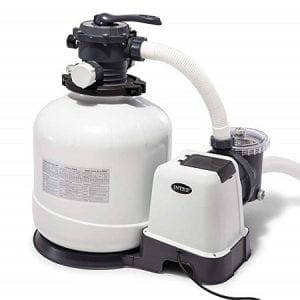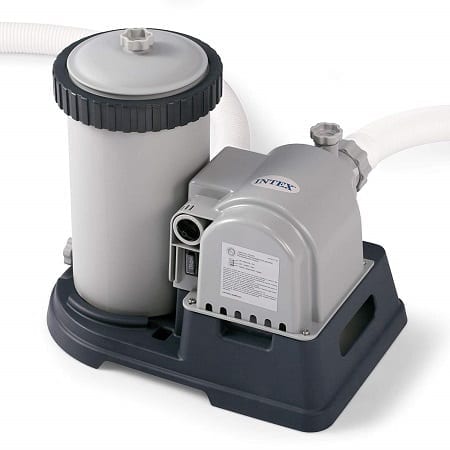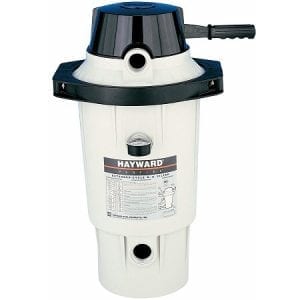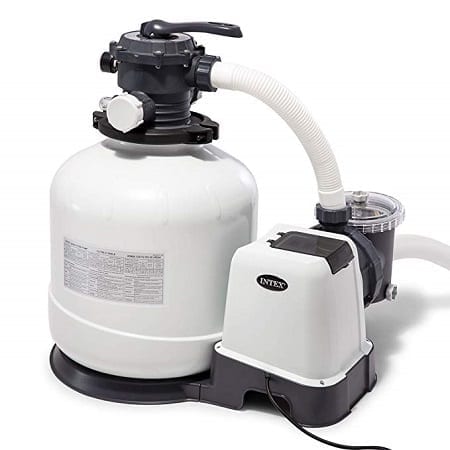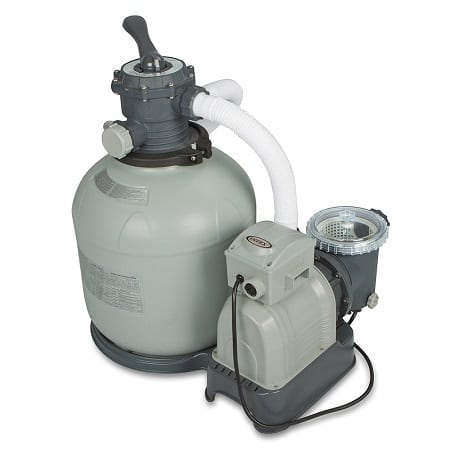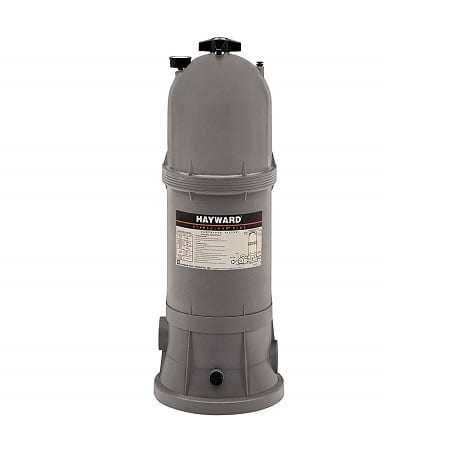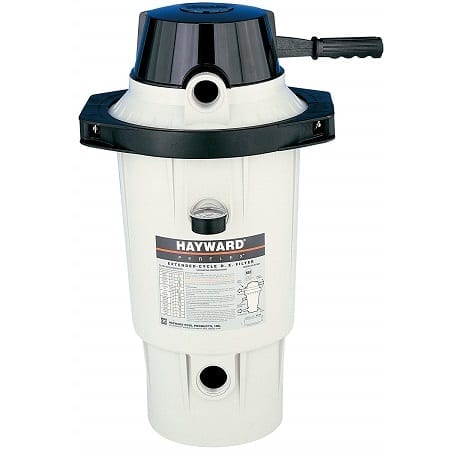Ah, the pool filter.
Probably the most underrated part of your swimming pool. Your pool filter is a critical part of keeping your pool clean, and ready to swim in, all summer long.
There are plenty of options when it comes to pool filters. Depending on the type of pool you have and the plumbing system that is installed, you have a few options on filter type.
The question then becomes, which filter is best?
Most pool owners use the same old product that they always have, but is that the best option on the market for your pool and plumbing?
But who wants to do that research?
We do! And we did! In this buying guide, we’ve compiled the best pool filters on the market. There is something here for just about every filtration and plumbing system.
We’ve also compiled some helpful filter information as well as some frequently asked questions, to help guide you through the process of buying your next pool filter.
Our Reviews Of The Best Pool Filters
Intex Krystal Clear Sand Filter Pump for Above Ground Pools
BEST OVERALL
The Intex filter has a 6-function control, which enables pool owner to filter, Backwash, rinse, recirculate, drain & close system.
Hydro aeration technology is incorporated into the filter pump for improved circulation & filtration, improved water clarity & increased negative ions at the water surface.
This pump, timer and filter works great.
FEATURED SPECS
Minimum Pool Size- 5,500 gallons
Maximum Pool Size- 19,600 gallons
EXTRA FEATURES
24 hour automatic timer
BENEFITS
- Improved circulation, filtration and water clarity
DRAWBACKS
- No skimmer, the hose connections can leak
Technical specifications
- Dimensions: 17.6 x 27.1 x 22.2 inches
- Weight: 52.7 pounds
- Type: Sand Filter
- Power: 0.75 horsepower, 110-120V with GFCI
- Flow Rate: Pump Rate: 3000 GPH. System Rate: 2, 450 GPH
Intex Krystal Clear Sand Filter Pump for Above Ground Pools
Keep your pool water safe and clean with INTEX Krystal Clear Sand Filter Pump.
Sand Filters are one of the most popular ways to keep pool water clean. They can sometimes pick up a lot more of the small algae and dirt particles floating around in your pool.
But not only is it effective, it saves on cost and time since the sand needs replacement just once every five years, not every two weeks like a filter cartridge pump.
Sand Filters are easy to maintain and a great alternative to keep your pool water sanitized.
FEATURED SPECS
Minimum Pool Size- 5,500 gallons
Maximum Pool Size- 19,600 gallons
EXTRA FEATURES
Includes: 6-way Valve, Pressure Gauge, Heavy Duty Tank, Strainer Basket, Built-in Timer
BENEFITS
- Specially designed for above ground pools. 24-hour timer with 2 to 12 hour preset cycles for automatic operation
DRAWBACKS
- Confusing to install
Technical specifications
- Dimensions: 27.1 x 17.6 x 25.5 inches
- Weight: 40.9 pounds
- Type: Sand Filter
- Power: Pump motor HP: 0.75, operates at 75% efficiency. Pool pump motor capacity: 0.59 HP. Name plate HP: 0.54
- Flow Rate: Pump flow rate: 3,000 gallons per hour. System flow rate 2,450 gallons per hour
Intex 28633EG Krystal Clear Cartridge Filter Pump for Above Ground Pools
BEST CARTRIDGE
Keep your pool water Krystal Clear and refreshing this summer with the Intex 2,500 GPH Filter Cartridge Pump.
This pump will circulate and filter the water in your above ground pool to keep everything clean, refreshing, and fun.
In addition, the maintenance for this pump is a breeze: just the occasional cartridge rinse or swap to keep this pump running strong.
This filter pump is the most powerful cartridge filter pump made by Intex, and is a must have for any above ground pool up to 24 feet in diameter.
FEATURED SPECS
Minimum Pool Size- 4,000 gallons
Maximum Pool Size- 15,200 gallons
EXTRA FEATURES
Double insulated pump with an auto timer with preset 2 to 12 hour cycles. Air Release valve for air trapped inside filter chamber and a sediment flush valve
BENEFITS
- Easy to use - simply replace the old cartridge with a new one every two weeks
DRAWBACKS
- Does not include the parts necessary to operate
Technical specifications
- Dimensions: 13.8 x 18.5 x 16 inches
- Weight: 19.5 pounds
- Type: Type B- Filter Cartridge Pump
- Power: 110-120V with GFCI
- Flow Rate: 2500 GPH
Hayward C1200 SwimClear Plus Cartridge Pool Filter
The Hayward Star Clear filters water like there’s no tomorrow!
Convenient reusable polyester pool filter cartridge provides up to 120 sq. ft. of heavy-duty dirt-holding capacity for extra-long filtration cycles.
Simply remove the filter cartridge and rinse with a garden hose when it becomes dirty.
Durable filter tank is constructed of Perma-Glas XL, a glass reinforced copolymer, for the ultimate in strength, durability and long life.
FEATURED SPECS
Maximum Pool Size- 57,600 gallons
EXTRA FEATURES
Includes pressure indicator gauge, manual air relief valve and convenient single lock knob to secure the filter tank
BENEFITS
- No backwashing requirement saves hundreds of gallons of water and money per year
DRAWBACKS
- No pressure gauge supplied
Technical specifications
- Dimensions: 13.5 x 36 inches
- Weight: 29lbs
- Type: Cartridge Pool Filter
- Power: 2HP
- Flow Rate: 120 GPM Res, 45 GPM public filter performance
Hayward EC40AC Perflex Extended-Cycle D.E. Pool Filter
BEST EXTENDED CYCLE
Perflex Extended-Cycle diatomaceous earth (DE) filters provide crystal clear, sparkling water at an economical price.
Perflex has set the standard in swimming pool filtration by incorporating the Flex-Tube design in combination with diatomaceous earth, the most effective filter media available.
FEATURED SPECS
Effective Filtration Area 20 Ft/sq.
EXTRA FEATURES
Patented Flex-Tube design gives longer cycles between cleaning because the same D.E. filter powder is used over and over
BENEFITS
- Clean pools fast, removing particles as small as two microns the first time through
DRAWBACKS
- If you tighten any of the connections - even finger tight - you risk cracking the plastic
Technical specifications
- Dimensions: 21.8 x 20.7 x 19 in
- Weight: 13.7-pounds
- Type: Extended-Cycle D.E. filter
- Power: 1HP Matrix Pump
- Flow Rate: 40 GPM
Types Of Pool Filters
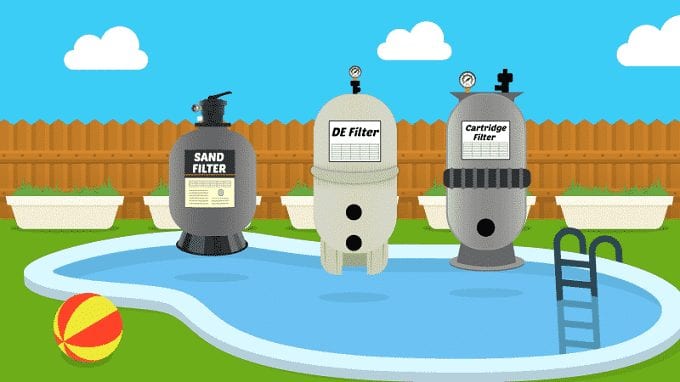
Pool owners have three different types of pool filters to choose from.
It is important to keep in mind when you are selecting a pool filter that not all filter types work in all systems.
So you need to make sure that you use the recommendations that were provided by your pool installer or from the manufacturer.
However, never select a pool filter simply on the basis of price. Just like most things, cheap pool filters may not be as good a quality as a slightly more expensive option.
You want to spend a little more money to ensure that your pool will be clean and that you won’t have to constantly replace filters.
There are three types of filters on the market to choose from. They are: sand filters, cartridge filters and diatomaceous earth or D.E. filters.
Each filter works a little different, costs different, and is better in particular applications.
Which you choose depends on these factors. To help you decide which is right for you and your system, here’s a brief breakdown of each filter.
Sand Filters
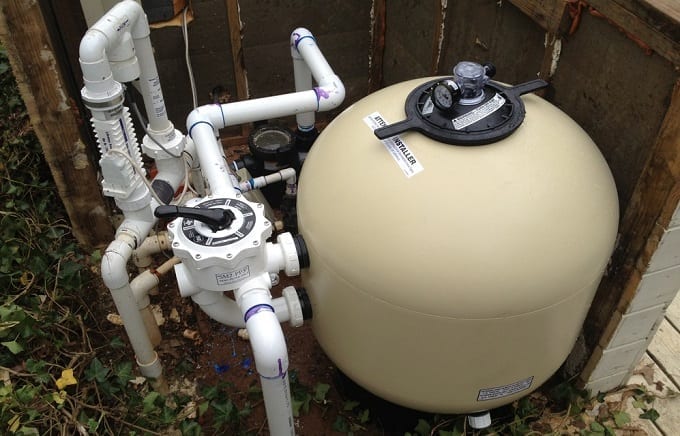
Sand filters are a great option for the pool owner that is working on a tight budget or one that doesn’t want to do a lot of pool maintenance.
Why? Well sand filters last a long time (five to seven years if properly cared for), can suck in large particles and until it gets plugged, can actually become more efficient over time.
Sand filters are filled with silica sand or something similar. Sand has rough edges, and these rough edges make sand very good at grabbing onto stuff.
As water passes through the sand filter, particles get stuck on the rough edges and stay in the filter, while clean water passes out of the filter.
This process continues until the gaps between sand particles get plugged, and need to be washed out, or backwashed.
Cartridge Filters
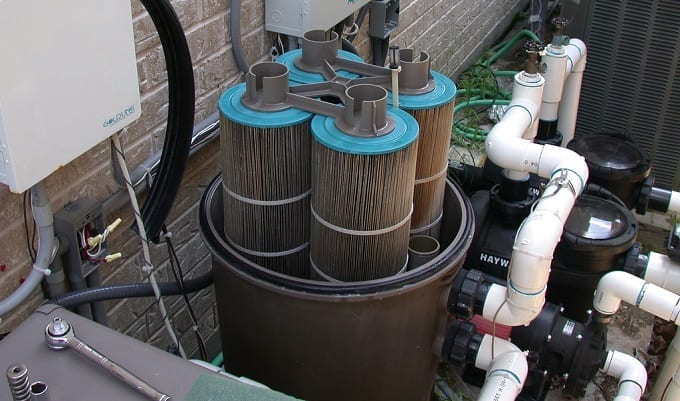
Cartridge filters are a great option for smaller pools.
They are slightly more expensive than sand filters but are just as efficient at cleaning your pool water.
Cartridge filters are made of a plastic tube surrounded by a polyester fabric media. Water flowing through the tube is pushed through the fabric, which traps debris and dirt.
Cleaning cartridge filters is very easy. Instead of backwashing like you do with sand filters, simply remove the filter from its tank and wash off with a hose.
Just make sure you do this away from your pool so that you don’t’ end up with all of that junk, back in your pool.
Diatomaceous Earth (DE) Filters
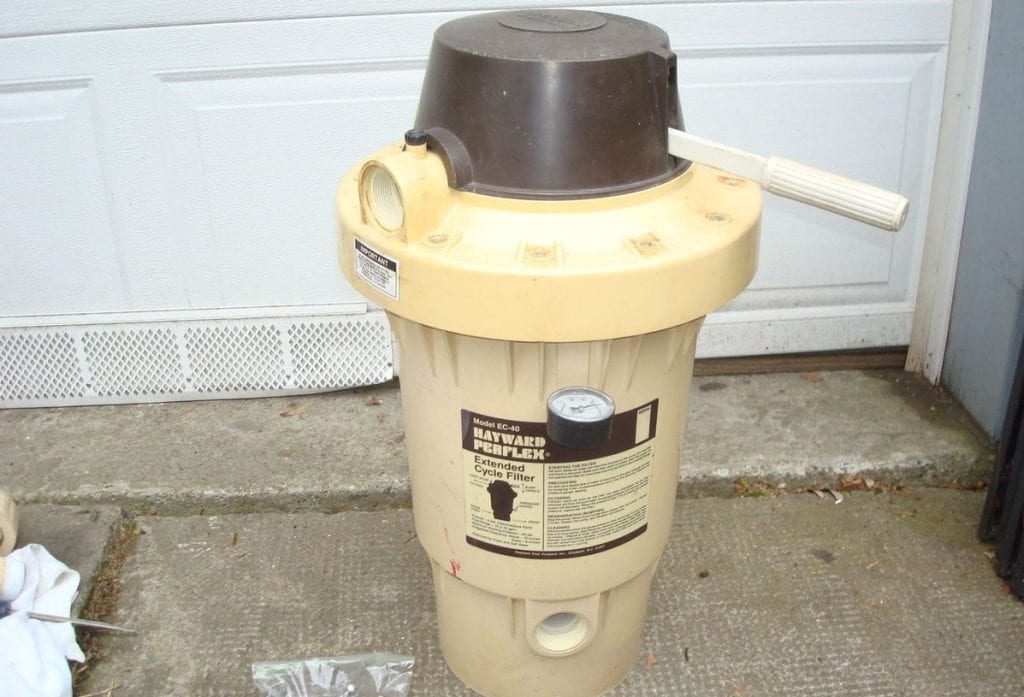
Pool Filter FAQs
Now that we’ve given you a bit of basic information on the different types of filters available for your pool, let’s move on to some frequently asked questions.
We’ve compiled this list of questions, based on the ones we are asked most often about pool filters.
How often should you replace pool filters?
The replacement of pool filters really depends on a couple of factors.
First, each type of filter has a different recommended life that you want to follow.
However this lifespan can be increased or decreased by how well you clean your pool and how well you maintain a good water quality.
A good rule of thumb is that filter life can be increased by maintaining good water quality, and balanced chemicals.
On the flipside of that coin, not cleaning your pool on a regular basis or misbalancing the chemicals in your pool, can shorten the life of filters.
For each filter type, the recommended filter replacement time is as follows:
- Sand Filters: Five to seven years.
- Cartridge Filters: Two to three years.
- DE Filters: Two to three years.
How often should a pool cartridge filter be cleaned?
Cartridge filters really require the least amount of maintenance, but unfortunately they are not the best option for all pump and plumbing systems.
Cartridge filters are very easy to clean, and if you are concerned about conserving water, they use the least amount of water to clean.
Cartridges should be rinsed off periodically throughout the use season.
You’ll know it’s time to clean the cartridges when they aren’t filtering as well or if your pump seems to be working harder.
This may only be a couple of times per season, or if you use your pool a lot, you may want to make this part of your monthly or bi-monthly maintenance routine.
However, deep cleaning of cartridge filters, using a cartridge cleaner is recommended at least a couple of times per year.
How long do DE pool filters last?
This is a tricky question.
In general, DE pool filters last between two and three years before they need to be completely replaced.
However, they do require a recharge of diatomaceous earth every time they are backwashed.
Backwashing can rinse out some of the smaller particles from the filter, so each time you do this process you will want to add more diatomaceous earth back to the filter.
This process extends the life of the filter, but only for so long.
Over time, all of the diatomaceous earth will breakdown and loose it’s efficiency. Once this occurs, you will need to completely replace the filter.
How do I know if my sand filter is bad?
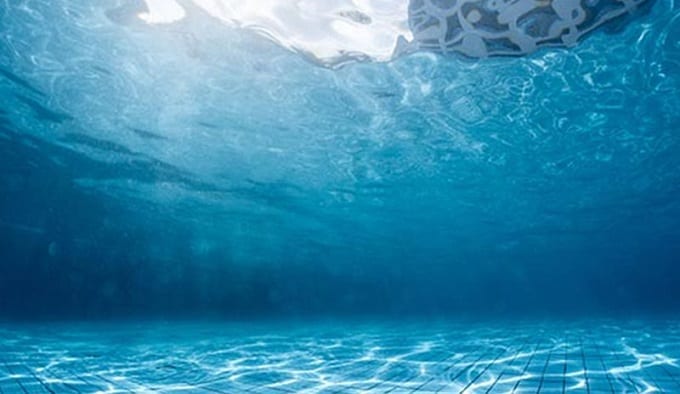
Over time, you can expect that your sand filter will start to lose its effectiveness.
As the sand in your sand filter ages, the particles lose their rough edges and stop grabbing on to debris as efficiently as they had once before.
However, there are other causes that your filter might not be working as well, included broken parts and bad sand.
No matter the cause, your sand filter will almost always have the same result if the filter is bad – cloudy water.
Cloudy water in your pool or near the filter outlet is a sure sign that your sand filter has a problem.
Can a sand filter remove algae?
Sand filters are amazingly efficient. And for most pool owners they are the preferred choice of filters.
The reason that they are so popular is because they are really good at cleaning just about everything from your pool water.
Most sand filters can catch particles as small as 20 microns, and as your sand filter gets dirty, it can filter even smaller particles.
Most algae cells range in the size of 10 to 150 microns in size. At this size sand filters are an excellent, cost efficient way to filter algae from your pool.
However, keep in mind that a good cleaning routine, and balanced water quality will reduce the strain on your sand filter, and limit the frequency of necessary backwashes.
How much does it cost to replace the sand in your pool filter?
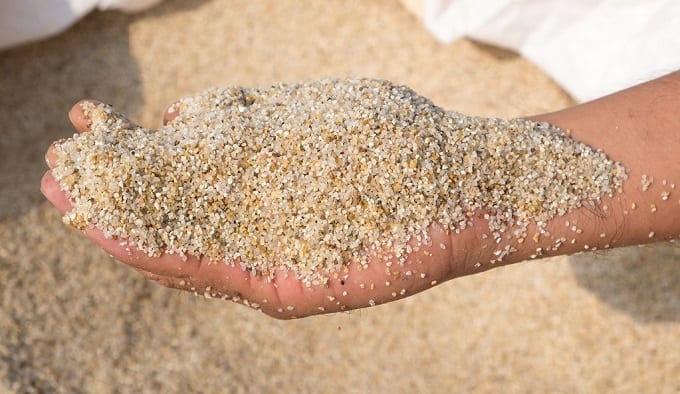
When it comes to replacing the sand in your filter, you have two options; do it yourself, or hire a pool company.
Here’s the scoop, if you are willing to take the time to do the work, and learn how to replace the sand in your filter, on your own, you can save a significant amount of money on both filters and labor.
Hiring a pool company to do the work, will cost you about $1000 for a large filter. Doing the work yourself requires minimal supplies, tools that most people have in their garage, and pool sand.
A fifty pound bag of pool sand costs around $30, and if you don’t have it at home, you need a roll of duct tape which costs less than $10.
Depending on the size of your sand filter the DYI project could cost you anywhere from $150 to around $500.
Conclusion
Your pool is a big investment, and you should take the time to create a good routine of maintenance.
One of the easiest ways to maintain your pool is to have a great pool filter installed. Pool filters can make the difference between a lot of hard work or a pool that is nearly maintenance free.
We’ve offered our suggestions for the best filters on the market.
However, we know that they aren’t your only options, so hopefully or FAQ section has given you good information to help you select the best filter for your swimming pool.
Did you like the article? Please rate it:

